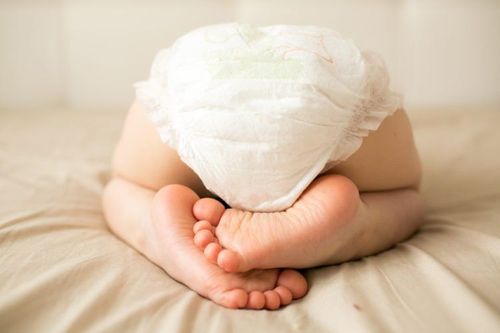The article was written by Doctor Nguyen Thai Ngoc Chau at the Department of Pediatrics - Neonatology in Vinmec Phu Quoc International General Hospital.
Children are very susceptible to digestive problems, especially abnormal stools, such as those containing white grains or blood. How should parents handle this situation?
1. What disease has white grains in the stool?
Normally, infants who are exclusively breastfed will have loose, slightly viscous, yellow stools with grains and foam. In general, babies have about 5-7 bowel movements per day. The color of the stool is determined by bile pigments and bile salts. If there is a small amount of bile, the stool may contain white grains, which are milk protein particles.
If the child has white stools but does not have a stomachache, does not cry, breastfeeds normally, sleeps well, and gains weight steadily, there is no need to worry. Parents should monitor the child, and if they see any other abnormalities, take the child to the hospital for evaluation.
In addition, the child may have white grains in stools with mucus or loose stools if the digestive system is affected by certain conditions such as fever, allergy to formula milk, infection, etc. If the child is fussy and refuses to breastfeed, the child should be examined immediately.
2. Bloody stools in newborns warn about what disease?
Newborn stools sometimes contain blood, causing many parents to worry. Blood mixed in the stool can be bright red or dark red. There are many causes of bloody stools in children such as:
- Anal fissures: anal fissures cause when the child is constipated, hard stools make the child try to push, causing anal bleeding, making the stool bloody. Anal fissures can heal themself or by application of ointment. When seeing a child having bloody stools due to anal fissures, the breastfed mother should eat a lot of fiber and cool foods to help the babies to defecate easily. For formula-fed babies, you should try changing to another type of milk.
- Colitis: bloody stools can be caused by colitis, which is related to a genetic factor. In addition, the baby's digestive system is still immature, so it is susceptible to infection, causing inflammation.
- Crohn's disease: Crohn's disease is a disease that causes inflammation and ulcers in the small and large intestines. Crohn's is also a genetic disease. If someone in the family has Crohn's, you should take your child for a check-up when you see blood in the stool.
- Allergy: Allergies to milk or food can cause your child to have bloody stools or mucus or particles.

When seeing a child having bloody stools, the first thing parents need to do is classify the cause and check the child's condition. If the child still eats and sleeps normally and does not cry, then monitor it. If the bloody stools persist, or the child cries abnormally, you should take the child to the doctor immediately.
To protect the baby's immature digestive system, it is necessary to breastfeed for at least the first 6 months. Breast milk contains many important nutrients, especially some antibodies that help protect the baby from harmful agents.
To arrange an appointment, please call HOTLINE or make your reservation directly HERE. You may also download the MyVinmec app to schedule appointments faster and manage your reservations more conveniently.









